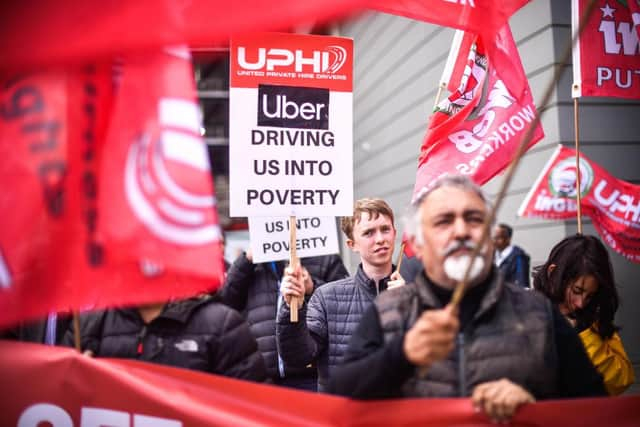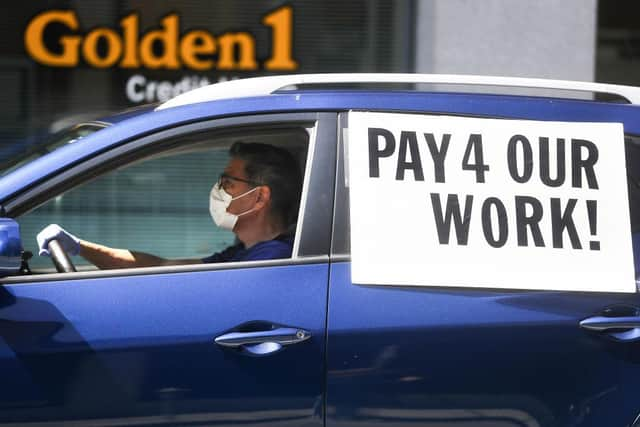Uber Supreme Court ruling: drivers to get minimum wage and holiday pay - what it means for ride hailing service
The UK’s Supreme Court has ruled that Uber drivers should be classed as workers, and not self-employed contractors.
Justices ruled on the latest round of a long-running fight between Uber operating companies and drivers today (19 February), following a previous hearing in July 2020.
Advertisement
Hide AdAdvertisement
Hide AdUber drivers are workers and will now be entitled to breaks, holiday pay and minimum wage, said the GMB union, which represents drivers and described the ruling as a “historic win.”


Here is everything you need to know about it.
Why were Uber in court?
The long-running legal dispute began in 2016 when an employment tribunal ruled that Uber drivers were workers and were entitled to workers’ rights, a ruling that was upheld by an employment appeal tribunal, and by Court of Appeal judges.


But lawyers representing Uber told Supreme Court justices that the employment tribunal ruling was wrong, and said drivers did not “undertake to work” for Uber but were “independent, third party contractors”.
Lawyers representing drivers then said the tribunal was entitled to conclude that drivers were working.
A panel of six Supreme Court Justices unanimously dismissed Uber’s appeal on 19 February – one justice fell ill before the ruling was delivered and so the usual seven Justices were not present.
Justice Lord Leggatt, said: “I think it clear that the employment tribunal was entitled to find that the claimant drivers were ‘workers’.”
At the time of the 2016 employment tribunal hearing, there were about 30,000 Uber drivers operating in the London area and 40,000 in the UK as a whole; around two million people were registered to use the Uber app as passengers in London.
What does it mean for me?
Lawyers said the ruling will have implications for the gig economy, though the impact on passengers’ experiences is likely to be minimal.
Advertisement
Hide AdAdvertisement
Hide AdIf anything, now Uber’s fleet will be entitled to rights such as sick pay and minimum wage – easing some of the financial uncertainty triggered by the coronavirus crisis – it’s more likely your next driver will have a friendly smile on their face.
What does it mean for Uber drivers?
Uber must now “do what’s right by the drivers who prop up its empire," said Mick Rix, GMB National Officer. “GMB will now consult with our Uber driver members over their forthcoming compensation claim.”
A law firm enlisted by GMB says drivers will now be entitled to compensation for lost pay, with some estimates suggesting thousands of Uber drivers could be entitled to an average of £12,000 each.
How much compensation drivers get will be decided once the case returns to an employment tribunal, a spokesperson from lawyers Leigh Day said.
Mark Cairns, an Uber driver in London, said: “Being an Uber driver can be stressful. They can ban you from driving for them at the drop of a hat and there’s no appeal process. At the very least, we should have the same rights as any other workers and I’m very glad.”
A lead claimant in the Uber case said the Supreme Court’s ruling will “re-order” the gig economy and urged the Government to strengthen employment protections for those who work in it.
James Farrar said: “Uber drivers are cruelly sold a false dream of endless flexibility and entrepreneurial freedom," he said. “The reality has been illegally low pay, dangerously long hours and intense digital surveillance.
"I am delighted that workers at last have some remedy as a result of this ruling, but the Government must urgently strengthen the law so that gig workers may also have access to sick pay and protection from unfair dismissal.”
Advertisement
Hide AdAdvertisement
Hide AdDriver Conrad Delphine told the PA news agency that he would now be able to have a holiday after years of working for the company.
He said: “I am very pleased. It means I can go on holiday without having to worry about how to pay for it. Things have been worse because of coronavirus. If we catch the virus we should be entitled to sick pay. It’s about time we had some decent pay and conditions.”